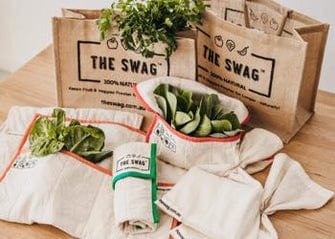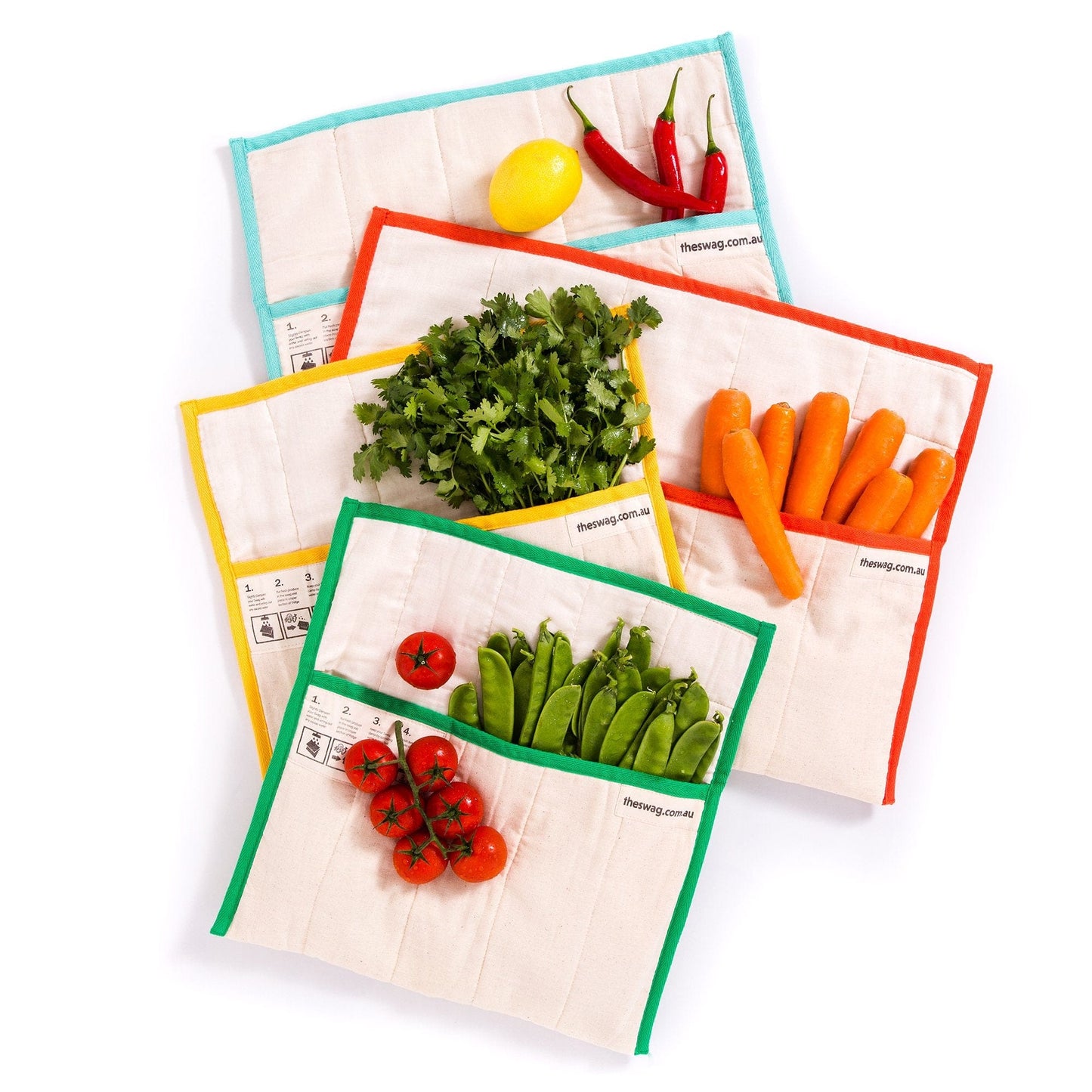Plus 5 Top Composting Tips & How To Compost Your Old Swag Bags
This week is International Compost Awareness Week which is a vital initiative for our planet. In a world where sustainability is becoming increasingly critical, our choices as consumers hold more power than ever before. From reducing plastic waste to supporting ethical practices, every decision we make can contribute to a greener, healthier planet. One significant step towards eco-conscious living is opting for products that are not only sustainable but also home-compostable. In this article, we'll delve into why it's crucial to choose home-compostable items and guide you through your composting journey. You’ll find 5 top composting tips for beginners plus a step-by-step guide to composting your old Swag bags!
The Importance of Home Compostable Products:
1. Reducing Landfill Waste:
Conventional products, such as plastics and synthetic materials, present a significant challenge to our environment when disposed of in landfills. These products not only occupy valuable space but also release harmful chemicals as they slowly degrade over decades or even centuries. In contrast, home compostable products offer a sustainable alternative. By breaking down naturally in home compost systems, they bypass the pitfalls of traditional waste disposal.
2. Closing the Loop:
Home compostable items complete the lifecycle loop by returning to the earth as compost. As they decompose, they enrich the compost with valuable nutrients, including nitrogen, phosphorus, and potassium, which are essential for healthy soil and plant growth. This closed-loop system fosters a more sustainable economy and a more harmonious relationship between human consumption and the natural world.
3. Mitigating Climate Change:
The decomposition process in landfills, characterised by anaerobic conditions (without oxygen), leads to the production of methane, a greenhouse gas. Methane emissions from landfills represent a significant contributor to climate change. However, by composting your waste at home, you can help mitigate these emissions by creating an aerobic environment that promotes the growth of beneficial microorganisms. These microorganisms break down organic matter efficiently, producing carbon dioxide instead of methane. Therefore, home composting not only diverts waste from landfills but also reduces greenhouse gas emissions, making it a truly valuable strategy in the fight against global warming.
4. Preserving Ecosystems:
When you choose home compostable products, you're making a choice that goes beyond just waste disposal. These products support biodiversity and the health of our ecosystems. By opting for home compostable items, you're reducing the demand for products made through conventional manufacturing processes. These processes often rely on destructive extraction practices like mining and deforestation, which can harm natural habitats and disrupt ecosystems. By reducing the demand for such products, you're helping to lessen the impact on these fragile environments. Opting for compostable products is a small yet impactful way to protect our planet's natural habitats.
What is the difference between compostable and biodegradable?
‘Compostable’ and ‘biodegradable’ are terms often used interchangeably, but they actually have distinct differences. While both refer to materials that break down over time, compostable materials specifically break down into nutrient-rich compost under the right conditions, contributing to soil health and supporting plant growth. On the other hand, biodegradable materials simply break down into smaller components over time, with no guarantee of environmental benefit or timeline. Compostable materials undergo a more rigorous certification process to ensure they meet specific standards for decomposition and environmental impact, whereas biodegradable materials may break down in various environments, including landfills, where they may still release harmful substances. Therefore, choosing compostable products over biodegradable ones can have a more positive impact on the environment, especially when it comes to waste management and soil regeneration.
Five Top Composting Tips For Beginners:
Balance Your Ingredients:
Achieving the right balance of greens (nitrogen-rich materials like food scraps and grass clippings) and browns (carbon-rich materials like dried leaves and newspaper) is crucial for successful composting. Aim for a ratio of roughly 2 parts browns to 1 part greens to create a healthy compost pile that decomposes efficiently.
Chop and Shred:
To speed up the decomposition process, chop or shred larger materials like branches, vegetable scraps, and cardboard into smaller pieces. Smaller particles have more surface area, allowing microbes to break them down more quickly. This also helps prevent the formation of dense, airless pockets within the compost pile.
Turn Regularly:
Regularly turning your compost pile aerates the materials, ensuring that oxygen reaches the microorganisms responsible for decomposition. Use a pitchfork or compost aerator to gently mix the contents of the pile every week or two. Turning also helps distribute moisture evenly throughout the pile, preventing dry or soggy spots.
Maintain Moisture Levels:
Consistent moisture is essential for microbial activity and decomposition. Your compost pile should have the moisture level of a wrung-out sponge. If it's too dry, sprinkle it with water using a hose or watering can. Conversely, if it's too wet, add more browns to absorb excess moisture and improve airflow.
Be Patient and Persistent:
Composting is a natural process that takes time, so don't expect instant results. Depending on factors like temperature, moisture, and the size of your materials, it may take several months to a year for your compost to fully mature. Stay patient and persistent, continue to feed your compost pile with organic waste, and eventually, you'll be rewarded with nutrient-rich compost for your garden.
How to Compost Your Old Swag Bags:
-
Gather Your Composting Materials:
To compost your old Swag bags, you'll need a compost bin or pile, browns (such as dried leaves or shredded paper), greens (kitchen scraps or yard waste), and water.
-
Prepare Your Swag:
Before composting, ensure your Swag bags are clean and free of any non-compostable materials, like plastic packaging or synthetic fibres. Please cut off and discard the care instructions label from your Swag bags.
-
Layering Technique:
Start by adding a layer of browns to your compost bin or pile. Then, place your Swag bags on top, covering them with another layer of browns. This helps balance the carbon and nitrogen ratio and promotes efficient decomposition.
-
Maintain Moisture and Aeration:
Keep your compost pile moist to facilitate microbial activity. Turn the pile regularly to aerate it, allowing oxygen to reach the microorganisms responsible for decomposition.
-
Monitor and Adjust:
Depending on environmental conditions and the size of your Swag products, composting may take several months. Monitor the temperature, moisture level, and odour of your compost pile, adjusting as needed to ensure optimal conditions for decomposition.
-
Harvest Your Compost:
Once your Swag products have fully decomposed, you'll be left with nutrient-rich compost ready to enrich your garden soil. Use it to nourish your plants, closing the sustainability loop and completing the journey of your eco-friendly Swag bags!
Choosing home compostable products isn't just about minimising waste; it's about embracing a more sustainable way of living. By opting for compostable products at home, you're not only reducing your environmental footprint but also actively contributing to a healthier planet for generations to come. So, with these top tips in your pocket, you’re now ready to compost your way to a greener future.
Ready to replace your Swag bag? Shop today.
Head to our website to explore our full range of home compostable and eco-friendly products and join the movement towards a more sustainable world



